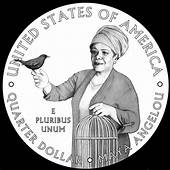The Women Quarters project is largely credited to California Rep. Barbara Lee, who after years of advocacy introduced the Circulating Collectible Coin Redesign Act of 2020; it passed last January. With Monday’s release, she celebrated “the phenomenal women who shaped American history (who) have gone unrecognized for too long – especially women of color.” There will be more, thanks to the Mint’s invitation to the public to submit other entries: From now through 2025, the series will also feature Wilma Mankiller, the first female Cherokee chief; Adelina Otero-Warren, a New Mexico suffragette; Sally Ride, the first woman in space; and Anna May Wong, the first Chinese-American film star. “Each time we redesign our currency, (it says) something about our country – what we value and how we’ve progressed,” said US Treasury Secretary Janet Yellen. Umm, yes and no, said Twitter. Many noted the new coin, echoing the Caged Bird, still has likely-slave-owner George Washington on the “heads” side; others asked where Harriet Tubman’s long-awaited $20 bill is, or noted the country’s still-raging misogyny, or suggested half a new coin is like a male boss giving a 40-cent raise and congratulating himself on your “empowerment.” We take heart from Angelou. “When people show you who they are the first time, believe them,” she famously wrote. Then, “When you don’t like a thing…change it.”










